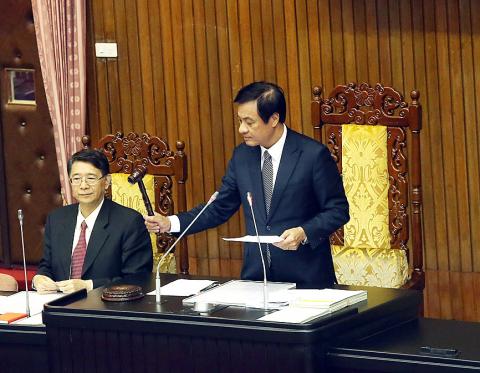The Legislative Yuan yesterday passed amendments to the Renewable Energy Development Act (再生能源發展條例), which set a goal for the nation’s renewable energy sources to reach a total of capacity of 27 gigawatts by 2025.
The Ministry of Economic Affairs is to review renewable energy development goals for next year and 2021, set development plans and publish the proportion that each source of renewable energy should contribute, according to the amended act.
To realize the goal by 2025, local governments should evaluate the potential for developing renewable energy sources in their jurisdiction, and may establish power generation facilities with an installed capacity of up to 2,000 kilowatts, the act says.

Photo: CNA
Power generation facilities with an installed capacity of greater than 2,000 kilowatts should be established by the ministry, it says.
The ministry should set up a renewable energy fund that draws from fees levied on non-renewable energy retailers, as well as on entities with self-use non-renewable power generation facilities, the act stipulates.
The ministry should establish a committee comprising representatives from relevant agencies, experts, academics and civic groups to review feed-in tariffs for the purchase of renewable energy and design a formula to calculate prices, it says.
The ministry may set out a period during which it can provide incentives for renewable energy generation facilities that it deems to have potential or for demonstration, the act says.
The amendments stipulate that renewable energy generation facilities can be established in Aboriginal territories in accordance with the Indigenous Peoples Basic Act (原住民族基本法).
If the premises of the government agencies, public schools or state-run enterprises undergo expansion or renovation, or if new structures are erected, they should be equipped with renewable energy generation facilities as long as sites meet the requirements, the act says.
The ministry said that the government’s “nuclear-free homeland by 2025” initiative aims to boost the proportion of renewable energy to 20 percent of the nation’s energy makeup, and the passage of the amendments would help to provide a legal basis for that goal.
Cities or counties that are home to state-run renewable energy generation facilities would receive some of the profits generated from clean energy sales as a reward, it said.
The amended act includes wording stating the government’s resolve to cut greenhouse gas emissions and improve the nation’s energy makeup.
Democratic Progressive Party Legislator Chen Man-li (陳曼麗), a sponsor of the amendments, said that the world invests more than twice as much in renewables as it does in fossil fuels.
At a time when industry leaders such as Apple, Sony and Google have joined the RE100 renewable power movement, the amendments would hopefully bring Taiwan clean energy, boost its economy and improve its global competitiveness, she said.

The inspection equipment and data transmission system for new robotic dogs that Taipei is planning to use for sidewalk patrols were developed by a Taiwanese company, the city’s New Construction Office said today, dismissing concerns that the China-made robots could pose a security risk. The city is bringing in smart robotic dogs to help with sidewalk inspections, Taipei Deputy Mayor Lee Ssu-chuan (李四川) said on Facebook. Equipped with a panoramic surveillance system, the robots would be able to automatically flag problems and easily navigate narrow sidewalks, making inspections faster and more accurate, Lee said. By collecting more accurate data, they would help Taipei

STATS: Taiwan’s average life expectancy of 80.77 years was lower than that of Japan, Singapore and South Korea, but higher than in China, Malaysia and Indonesia Taiwan’s average life expectancy last year increased to 80.77 years, but was still not back to its pre-COVID-19 pandemic peak of 81.32 years in 2020, the Ministry of the Interior said yesterday. The average life expectancy last year increased the 0.54 years from 2023, the ministry said in a statement. For men and women, the average life expectancy last year was 77.42 years and 84.30 years respectively, up 0.48 years and 0.56 years from the previous year. Taiwan’s average life expectancy peaked at 81.32 years in 2020, as the nation was relatively unaffected by the pandemic that year. The metric

TAKING STOCK: The USMC is rebuilding a once-abandoned airfield in Palau to support large-scale ground operations as China’s missile range grows, Naval News reported The US Marine Corps (USMC) is considering new sites for stockpiling equipment in the West Pacific to harden military supply chains and enhance mobility across the Indo-Pacific region, US-based Naval News reported on Saturday. The proposed sites in Palau — one of Taiwan’s diplomatic allies — and Australia would enable a “rapid standup of stored equipment within a year” of the program’s approval, the report said, citing documents published by the USMC last month. In Palau, the service is rebuilding a formerly abandoned World War II-era airfield and establishing ancillary structures to support large-scale ground operations “as China’s missile range and magazine

A 72-year-old man in Kaohsiung was sentenced to 40 days in jail after he was found having sex with a 67-year-old woman under a slide in a public park on Sunday afternoon. At 3pm on Sunday, a mother surnamed Liang (梁) was with her child at a neighborhood park when they found the man, surnamed Tsai (蔡), and woman, surnamed Huang (黃), underneath the slide. Liang took her child away from the scene, took photographs of the two and called the police, who arrived and arrested the couple. During questioning, Tsai told police that he had met Huang that day and offered to